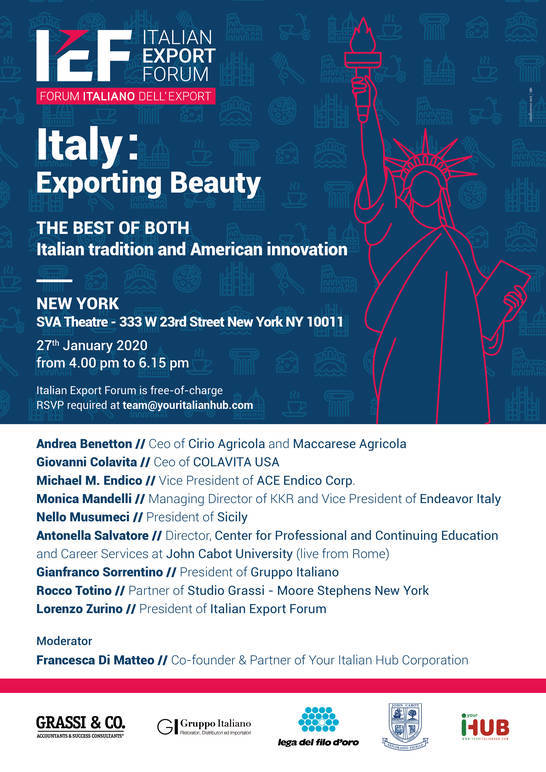“We Need to Educate the Trade and the General Public”
You are the President of ‘Gruppo Italiano’. Why did you establish an organization that regroups the Italian restaurant presence in the US together with professionals in the import/export and distribution sectors?
GRUPPO ITALIANO (GI) was established in 2017 on the heels of its predecessor organization, GRUPPO RISTORATORI ITALIANI (GRI) to keep a strong educational voice before the trade. We wanted to discuss the Italian cuisine authenticity and the sustainable practices used to produce quality Italian products; explore and help solve the challenging issues facing the hospitality industry as a whole; and create a better understanding of the importance of Italian cuisine being viewed as top quality, healthy, nutritious and safe. It is of critical importance for the Italian restaurants, importers, and distributors to engage in dialogue and then speak in a united voice to get these ideas out into the general public (essentially our customers) and also into the marketplace. There is no trade organization filling this role at the moment with exception of the Italian Trade Commission with whom we have a wonderful working relationship in seeking these goals.
Why is it important from your perspective to discuss Italian export in the US?
The trade and the general public consumer(s) need to be educated on what it takes economically to present high quality products that make up the menus at our Italian restaurants across the country. Good Products are greatly affected by sustainable and traditional farming and manufacturing processes in Italy. There are reasons—-economic and otherwise—-why menus vary, and why one restaurant is more expensive than another. They both have delicious dishes, but the price differences and other factors need to be understood so that the consumer can make educated choices on what and where they eat. Believe me, there is much more work to do in this area. Educating the trade and the general public is a never-ending endeavor.
How would you assess the situation of the ‘Made in Italy’ brand in the US food and beverages market today?
The importance lies once again in education and the promotion of the notion of “authenticity”. Great Italian dishes are made from great Italian products, “Made in Italy”. That is simple to understand. However, great Italian dishes in the US are also made using wonderful local products, employed in creative ways by Italian-American and American chefs. I applaud that trend in our business. But I do not want the trade and consumers here to lose site of quality, spirit, tradition, and history of Italian cuisine. To explore variations of traditional dishes is a natural outcrop of the world getting smaller, with more and more people traveling and experiencing other countries. Thus the defining of “authenticity” has become a complex issue—-and we will be holding a seminar soon to discuss this. Regardless of its definition, “authenticity” provides a reference point (a gold standard, if you will) that allows us to better understand and enjoy our cuisine and the creatively to freely explore the variations of our national and regional dishes
What's the Italian place and role in the restaurant scene of New York and other big US cities?
According to the National Restaurant Association's “Global Palates”, Italian food still reigns as a favorite among consumers. Other surveys may put Chinese or Mexican cuisine first. Regardless, and undoubtedly, the position of Italian cuisine is strong in the minds of restaurant patrons. This is an enviable position. However, many consumers still are confused as to what is real Italian cuisine. Many merely define favorites like pizza, chicken parmigiana,and spaghetti and meatballs as sole representations of Italian cuisine. I feel strongly that the role of Italian restaurants—as GRUPPO ITALIANO sees them—need to go further to help define and offer consumers what is true, authentic Italian cuisine. We again must take the role, through our businesses, of educating the trade and general public. Restaurants are on the frontline of this responsibility.
---
Attendance to the "Italian Export Forum" is free-of-charge
January 27th 2020
from 4.00 pm to 6.15 pm
Please RSVP team@youritalianhub
NEW YORK
SVA - School of Visual Art - SVA - Theatre
333 W 23rd St
New York, New York



































i-Italy
Facebook
Google+
This work may not be reproduced, in whole or in part, without prior written permission.
Questo lavoro non può essere riprodotto, in tutto o in parte, senza permesso scritto.